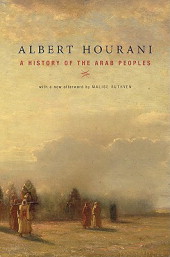The Historian's Sordid History
A famous historian and legendary professor hid his radically anti-Zionist past.
 If I may be allowed a small historiographic digression.
If I may be allowed a small historiographic digression.
In a review of Ilan Pappe's two most recent books, I wrote that Albert Hourani, an Englishman of Christian Lebanese origin who later became a major historian of the Middle East (A History of the Arab Peoples), had in 1945-1947 "served as a spokesman for Haj Amin al-Husseini and the Palestinian cause."
Some of Hourani's former students—he taught in Oxford University, where he was a much-respected figure—took umbrage and (rightly) pointed out that the Arab Office in London, for which Hourani then worked, was not created or run by Husseini. In fact, it was created by the newborn Arab League to persuade and disseminate pro-Palestinian propaganda and was directed by Musa al-Alami, a Palestinian notable who at the time was in Husseini's bad books (though a few years before, al-Alami had represented the Palestinian leader).
Hourani—who later regretted his brief venture into politics—in 1946 represented the Arab Office before the Anglo-American Committee, which was looking into the future of Palestine. In speech and writing, he had voiced (albeit in high-class English) unconciliatory views identical to Husseini's: No to compromise, no to a Jewish state, no to partition, no to a binational state. Like Husseini, Hourani demanded all of Palestine for the Arabs, every inch of it.
Hourani's testimony was praised at the time by British and Zionist observers for its civility and intellectual rigor and depth, portraying him as the most effective of the Arab spokesmen. And years later, Hourani was to say that "some kind of partition was the only solution."
But that wasn't his position in 1946. Indeed, RHS Crossman, then a Labour Party MP, wrote that men like Hourani were "actually more intransigent in their policy than the old leaders…Hourani is quite right to feel that if he is to represent the literate Arabs of Palestine, then he must speak the same language as the Mufti [Haj Amin al Husseini], otherwise he will be rejected as a British agent …"
The British at the time held up Hourani as a "moderate"—but he was only a "moderate" (like Husseini's chief rival in the Palestinian political arena, Raghib Nashashibi) in his attitude to the British, hoping for and working toward British support for the Palestinian cause. In all that concerned Zionism and Zionists, in terms of substance (which he was wont to cloak in "moderate" language), he was as extreme as the best of them. The British Foreign Office said at the time of the Arab Office: "Their views on Zionism were uncompromising."
Hourani in his testimony before the Anglo-American Committee assured his listeners that Jews would enjoy civil rights in the future Palestinian state. But he also appeared at the time to share in the racist prejudices of his age and society of origin. He wrote (a year after the Holocaust): "The abnormal position and history of the Jews has bred in them certain characteristics—suspicion, clannishness, a sense of insecurity and inferiority—which themselves in turn have become contributory causes of persecution." Hourani seemed to be suggesting that the Jews were at least partially responsible for what the Nazis had done to them (and perhaps for what Christians and Muslims had done to Jews during the previous 1900 years)—a passage more or less echoed in Husseini's writings a few years later. At the time, the Arab Office also declared (it is not clear if the words were actually penned by Hourani): "The Nazis fastened their domination upon Europe by making use of every weakness they could find in the European body politic. Just so a Jewish state would hover like a vulture over the Arab body politic."
It would appear that the Holocaust had not had a great immediate impact on Hourani. Later, in his years as a don in Oxford, so I am told (I never met him), he had a reputation as a very warm and cultured doktorvater, both among Jewish (and Israeli) and Gentile students whom he supervised (among these was Ilan Pappe), and among his colleagues. But this should not be allowed to cloud judgment about Hourani's positions in the 1940s.
